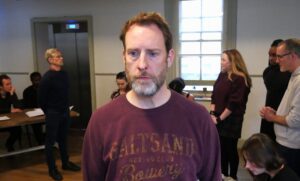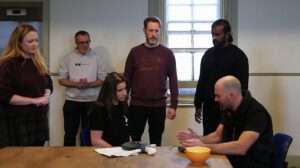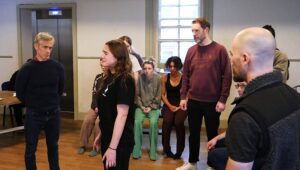News Article
Preview: The Crucible
29 Oct 25
Director Yohann Philip introduces his take on Arthur Miller’s 20th century classic; a story inspired by the 1692 Salem witch trials, but serving as an allegory for the McCarthyist anti-communist fervour gripping the USA in the 1950s.

What drew you to directing this play?
I’ve always been fascinated by The Crucible, particularly its exploration of power, mass hysteria, and how ordinary people can destroy each other when panic takes hold. The story is rooted in the real Salem witch trials of 1692, one of history’s greatest tragedies: fourteen women, five men, and two dogs were executed for witchcraft, and a further 144-185 “witches and wizards” were accused, including imprisonment and torture; the oldest was eighty, and the youngest victim was just five years old.
I’ve always found witches as symbols of terror compelling. Although there are no real witches in this play, the fear of them still holds extraordinary power over people’s imaginations. The idea that a community can collapse under its own paranoia feels painfully familiar.
In our time, not a day goes by without someone being cancelled for their opinions or vilified for their mistakes. Social media and technology have put us under ever-greater scrutiny, allowing people to hide behind screens and inflate outrage for its own sake. We saw it after the Euro 2021 final, when England’s Black players Bukayo Saka, Marcus Rashford, and Jadon Sancho faced horrific racial abuse simply for missing penalties.
The same collective hysteria resurfaced during the riots of the last two summers, when violent protests against immigration erupted. It was a stark reminder of how quickly fear can turn to hate, and how easily misinformation fuels chaos. That kind of moral panic, and the need to find someone to blame, is the same impulse that drives The Crucible. Whether in 1692 Salem or 2025 Britain, the witch hunt always finds a new form.

For anyone unfamiliar with what’s become a classic, what themes does the play explore?
The themes are incredibly relevant today: fear of “the other”, mob mentality, and the dangers of groupthink. At its heart, it asks how far we’ll go to protect our reputation, and what truth is worth when the crowd turns against us.

What have been the challenges in directing?
Staging the play has been exciting but demanding. The space itself is quite intimate, and we’re deliberately leaning into that claustrophobia, which makes movement and pacing more complex. Every rehearsal feels emotionally charged because this is not a play you can do halfway; it requires the cast to dig deep, and it has been incredibly intense for everyone.
We’re also weaving in live singing and physical movement, which has been rewarding but challenging alongside an already long and complex piece.

What do you hope the audience will take away from your interpretation?
Although it sounds simple, if we can all be a little kinder, a little more tolerant, a little more forgiving, that would be enough. Not everyone is an angel, and not everyone is a demon. We’re all fragile and fallible. It’s this moral greyness that terrified the Puritans: you were either pure or damned, a Christian or a witch. The uncertainty itself was dangerous. Strangely, in Salem, those who confessed to lies survived, while those who stood firm in truth were executed.
Our interpretation is set in a crumbling monolithic landscape, purposefully nameless and stripped of traditional Puritan imagery, because this story did not just happen in Salem. It is happening now, in the UK, around the world, and most visibly, online. I wanted to create a claustrophobic, immersive experience where the audience feels like they are part of the trials, forcing them to question their own role in mass hysteria. If the production makes people even a little more aware of those parallels in everyday life, and think before joining the mob, then it will have done its job.

Describe the show in three words
Brutal. Harrowing. Timeless.

The Crucible plays at SLT Fire Station 10 – 15 November 2025.
Join the waiting list for tickets here – the show is sold out